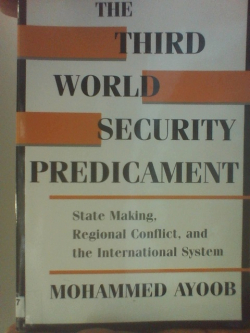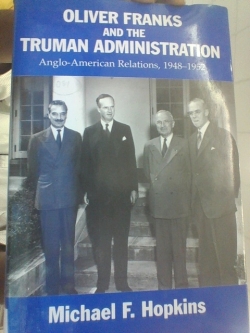Weak States in the International System

Buy online ($)
Type
Book
Authors
ISBN 10
0714633852
Category
327-International Relations
[ Browse Items ]
Publication Year
1990
Publisher
FRANK CASS, United States
Pages
318
Subject
1. International relations. 2. States, Small.
Tags
Abstract
Professor Handel’s book provides an illuminating analysis of the position of the weaker states in international politics, the problems of their defense, and their attempt to improve their bargaining strength vis-a-vis the most powerful states. Instead of giving a simple definition of what a weak state is, as is often done, ideal types are suggested: an ideal type of the great power and an ideal type of the weak state. In reality no state is all powerful or completely powerless. These ideal types are based on a detail analysis of the stratification of states according to a large set of criteria.
The book proceeds to examine the possibilities of maneuver for weaker states in different types of international system (i.e. a bipolar world, in a balance of power system, and so on). The position of weak states within a sphere of influence of one of the great powers is compared to that of weak states that are “free to maneuver” and are not included within any orbit of the great powers. In addition the costs and benefits for weak states participating in alliances are examined, as well as the special cases of patron – client relationships in international politics.
The possibilities of weak states acquiring nuclear weapons as the “great equalizer” is examined, though it becomes apparent that nuclear weapon do not diminish the power gap between the weak and the powerful. The acquisition of nuclear weapons is considered by weak states only Vis-a vis other weak states, and as a bargaining counter in relationship to the great powers.
The final chapter is devoted to a detailed discussion of the economic draw backs of the weak states according to accepted economic common sense. It appears that, economically small states have not been doing so badly and have done much better than suggested by simple economic size theories.
The book examines many of the weaker states in both the developed and under developed worlds in Europe, Eastern Europe, Latin America, Asia and Australia. It is based not only on modern diplomatic but also on the study of earlier periods in history.
The book proceeds to examine the possibilities of maneuver for weaker states in different types of international system (i.e. a bipolar world, in a balance of power system, and so on). The position of weak states within a sphere of influence of one of the great powers is compared to that of weak states that are “free to maneuver” and are not included within any orbit of the great powers. In addition the costs and benefits for weak states participating in alliances are examined, as well as the special cases of patron – client relationships in international politics.
The possibilities of weak states acquiring nuclear weapons as the “great equalizer” is examined, though it becomes apparent that nuclear weapon do not diminish the power gap between the weak and the powerful. The acquisition of nuclear weapons is considered by weak states only Vis-a vis other weak states, and as a bargaining counter in relationship to the great powers.
The final chapter is devoted to a detailed discussion of the economic draw backs of the weak states according to accepted economic common sense. It appears that, economically small states have not been doing so badly and have done much better than suggested by simple economic size theories.
The book examines many of the weaker states in both the developed and under developed worlds in Europe, Eastern Europe, Latin America, Asia and Australia. It is based not only on modern diplomatic but also on the study of earlier periods in history.
Description
This work defines weak states and their strengths and weaknesses. It examines why they are weak and their position in different international systems as well as their economic positions. - from Amzon
Biblio Notes
CONTENTS
Chapter 1 Definitions and Characteristics of the Weak States ................ p. 9
- The Great Powers ................................................. P. 11
- The Middle Power ................................................. P. 23
- The Weak States .................................................. P. 30
- The Mini States .................................................... P. 47
- Summary: The Ideal Type of the Weak State ........... P. 48
Chapter II Internal Sources of Weakness and Strength of the Weak State .P. 67
- The Geographical Position of Weak States ............... P. 70
- The Military Position of Weak States ....................... P. 76
- The Utility of Military Strength for the Weak............. P. 90
- Summary
- A Note on Passive Resistance (Nonviolent Action) by Weak States ............ P. 104
Chapter III External Sources of Weakness and Strength of the Weak States . P. 119
- Formal Alliance between Weak States and Great Powers .......................... P. 121
- Patrons and Clients: A Perspective on Weak State-Great Power Relations ... P. 131
- Weak States and the Benefits of Collective (Public) Good ......................... P. 148
- Alliances of Weak States ..................................................................... P. 153
Chapter IV. The Position of Weak States in Different International Systems . P. 169
- The Weak States and the Great Powers' Spheres of Influence .................. P. 171
- Weak States in a Balance-of-Power or Multipolar System ......................... P. 175
- Weak States in Bipolar Systems ........................................................... p. 187
- Maneuvrability in a Nuclear World ........................................................ P. 195
- Problems of Nuclear Weapon Acquisition by the Weak States ................... P. 197
Chapter V. The Economic Position of the Weak States in the International System ................... P. 217
- Sources of Economic Weakness ........................................................... P. 220
- Modifications, Qualifications and Caveats .............................................. P. 229
- The Application of Economic Pressure against Weak State ....................... P. 236
- Conclusion ......................................................................................... P. 225
Chapter 1 Definitions and Characteristics of the Weak States ................ p. 9
- The Great Powers ................................................. P. 11
- The Middle Power ................................................. P. 23
- The Weak States .................................................. P. 30
- The Mini States .................................................... P. 47
- Summary: The Ideal Type of the Weak State ........... P. 48
Chapter II Internal Sources of Weakness and Strength of the Weak State .P. 67
- The Geographical Position of Weak States ............... P. 70
- The Military Position of Weak States ....................... P. 76
- The Utility of Military Strength for the Weak............. P. 90
- Summary
- A Note on Passive Resistance (Nonviolent Action) by Weak States ............ P. 104
Chapter III External Sources of Weakness and Strength of the Weak States . P. 119
- Formal Alliance between Weak States and Great Powers .......................... P. 121
- Patrons and Clients: A Perspective on Weak State-Great Power Relations ... P. 131
- Weak States and the Benefits of Collective (Public) Good ......................... P. 148
- Alliances of Weak States ..................................................................... P. 153
Chapter IV. The Position of Weak States in Different International Systems . P. 169
- The Weak States and the Great Powers' Spheres of Influence .................. P. 171
- Weak States in a Balance-of-Power or Multipolar System ......................... P. 175
- Weak States in Bipolar Systems ........................................................... p. 187
- Maneuvrability in a Nuclear World ........................................................ P. 195
- Problems of Nuclear Weapon Acquisition by the Weak States ................... P. 197
Chapter V. The Economic Position of the Weak States in the International System ................... P. 217
- Sources of Economic Weakness ........................................................... P. 220
- Modifications, Qualifications and Caveats .............................................. P. 229
- The Application of Economic Pressure against Weak State ....................... P. 236
- Conclusion ......................................................................................... P. 225
Number of Copies
1
| Library | Accession No | Call No | Copy No | Edition | Location | Availability |
|---|---|---|---|---|---|---|
| Main | 173 |
327.101 HON |
1 | Yes |




